World Championships Glasgow 2015Oct 16, 2015 by Rebecca Johnson
Houry Gebeshian: Determined Dreamer, 26 And Still Going Strong
Houry Gebeshian: Determined Dreamer, 26 And Still Going Strong
The gym is dark, empty, awaiting the arrival of one soul to occupy it for a long, laborious practice. The door creaks open, the lights flip on, and the nex
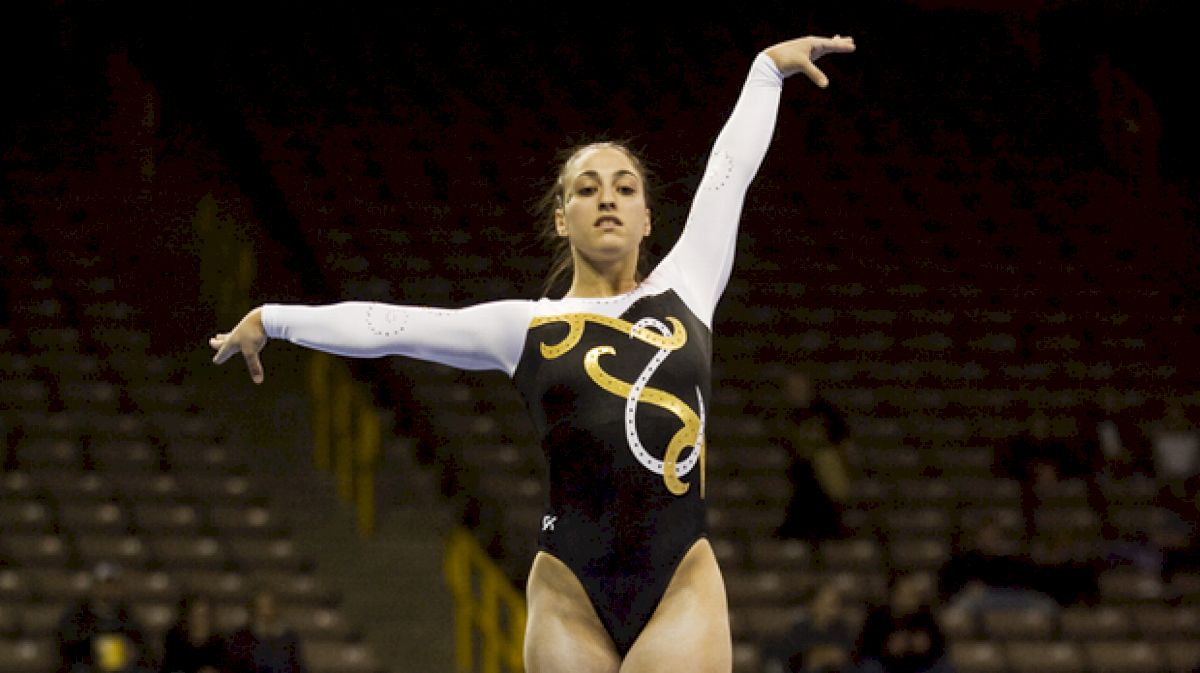
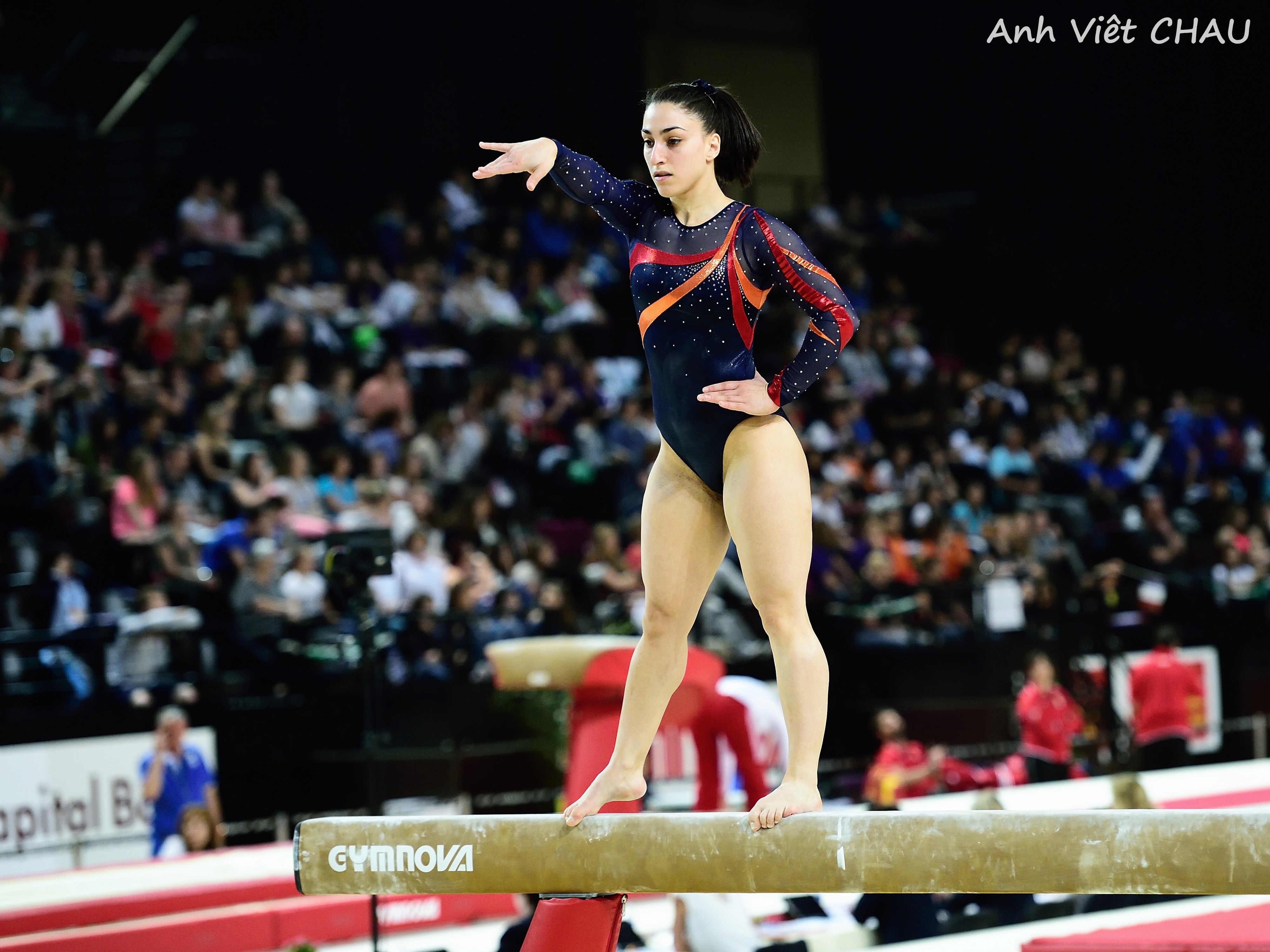
The gym is dark, empty, awaiting the arrival of one soul to occupy it for a long, laborious practice. The door creaks open, the lights flip on, and the next four hours are spent in sweaty pursuit of the Rio Olympics.
Houry Gebeshian is both the passenger and pilot on this unlikely, solitary journey, one which will make its first stop at the World Championships in Glasgow.
The Armenian-American, a one-time standout for the University of Iowa, is her own training partner, and essentially her own coach, every single day.
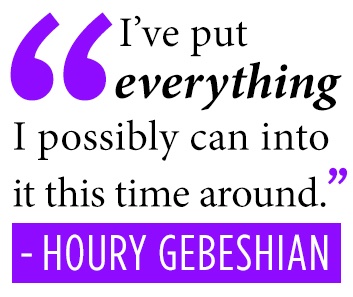
Gebeshian has defined determination in her approach to the challenges ahead. After a huge letdown in her quest to compete in the 2012 London Games, she walked away from the
sport for several years, but ultimately couldn’t stay away.
Now aged 26, which in gymnastics years might as well be 96, she knew a return to gymnastics to represent Armenia on the sport’s biggest stage would take every ounce of effort in her being.
It is a commitment she is willing to make.
“I know that I have these goals,” Gebeshian said, “and I know that the disappointment of four years ago is definitely a driving factor…I’ve put everything I possibly can into it this time around.”
Determined From A Young Age
Gebeshian was born on July 27th, 1989 in a small Massachusetts town, which quickly became her land to run free. She had more energy than her parents could handle—rolling around, jumping off everything in sight. Containing this energy was a futile effort.
“My mom always tells the story about how I used to wiggle myself out of my car seat all the time and she would say, ‘This girl! This girl is too active!’” Gebeshian said.
Gymnastics became Gebeshian’s first love. From age five to age 18, she trained at Massachusetts Gymnastics Center in Waltham, Mass. under coaches Patrick Palmer, Shi Xin Mao, and sports psychologist “Doc” Massimo.
From early on in her career, Gebeshian and her club teammates worked hard in the gym, and in turn, found success at competitions.
“We were always on top of the podium…we would stay up there and just kind of rotate around—first, second, and third place,” she said.
After winning first all-around at one of her first competitions, Gebeshian was hooked.
“I took gymnastics very seriously…but I loved going in every single day,” Gebeshian said.
She progressed through the levels, skipped level eight, and joined the older group of advanced gymnasts. When high school began, and all of her teammates moved on from the sport, Gebeshian was left as the last one standing from her original group.
But her inner fire still burned strong.
Third Time’s The Charm
Adversity is a normal part of any athlete’s experience, and Gebeshian was no different. During her freshman year of high school, she competed level 10, and had the opportunity to make it to Nationals. However, she lacked the full belief in herself to qualify, and left Regionals as the first alternate to Nationals— the closest she could’ve been to achieving the main goal.
“I wasn’t too disappointed because I knew that I had a few more years to get there,” Gebeshian said. “I had the confidence now knowing that I was close without really trying.”
Gebeshian was motivated by her freshman season, and had higher expectations for herself the next year. She not only had the ability to compete at the National level, but also the mindset to accomplish the goal.
Sophomore year, Gebeshian qualified to Nationals and said she felt like a superstar.
“I realized it was a little preview to what college competition would be like,” she said.
What she didn’t realize was how similar the patterns would be.
Gebeshian Takes Iowa
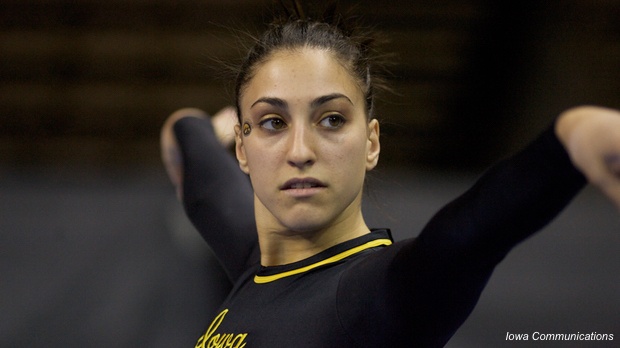
College gymnastics wasn’t even on the radar of the future Big 10 beam champion and 2011 NCAA all-around qualifier. Gebeshian had not seen one gymnast go off to compete college throughout her entire career.
“Just like everyone else in my club, I thought I was going to be done when I was done with high school,” she said.
She didn’t put out recruiting videos until college coaches starting contacting her club coaches after Nationals her junior year. Soon, those coaches started coming to the Massachusetts Gymnastics Center to watch Gebeshian practice, and she went on five official recruiting trips, with Iowa being the last.
She loved the campus, the coaches, the academics, and the family feel. In turn, Iowa became Gebeshian’s home for four years.
“I felt I really belonged somewhere, and I felt like they appreciated me for who I was and what I offered them,” Gebeshian said.
During her freshman year, Gebeshian didn’t really know what to expect, and was “just doing the sport I love…just getting out there doing my routines.” But expectations rose higher and higher every year that she was on the team.
“We had better and better girls coming into the team as the years cycled,” Gebeshian said. “So, I think in general our team got better, which pushed me to get better.”
Her sophomore year, Gebeshian clicked with the team’s new volunteer coach, Linas Gaveika, who focused on the technical side of the sport like her club coaches did. Gaveika’s very first impression of his new pupil were that she was very determined and extremely competitive.
“She was very determined and I knew she was very competitive,” Gaveika, who became an assistant coach in Gebeshian’s junior year, said. “I loved that immediately.”
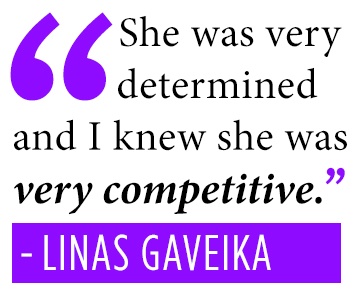
“I felt that Linas understood me and I understood him,” Gebeshian added. “He pushed me just enough to get me to kind of where I wanted to go. So I owe a lot to him.”
Nevertheless, it was an uphill climb.
Junior year was very challenging for Gebeshian academically, athletically, and personally. Her season was not going well, she wasn’t leading the team the way she wanted to, but managed a small breakthrough.
“I turned everything around and became the Big Ten balance beam champion that year,” Gebeshian said.
At Regionals, Gebeshian competed all-around, but got a little anxious, lost her focus, and didn’t compete up to her potential. The result: first alternate to NCAA Nationals.
“Most of my disappointment came from knowing I could have done better,” Gebeshian said.
But in that disappointment, Gebeshian added that she realized, “Hey, I’m actually a pretty good competitor, and I can compete with the best on the stage…I think I definitely stepped it up then.”
A changed mindset heading into her senior year provided her last chance to achieve her goal
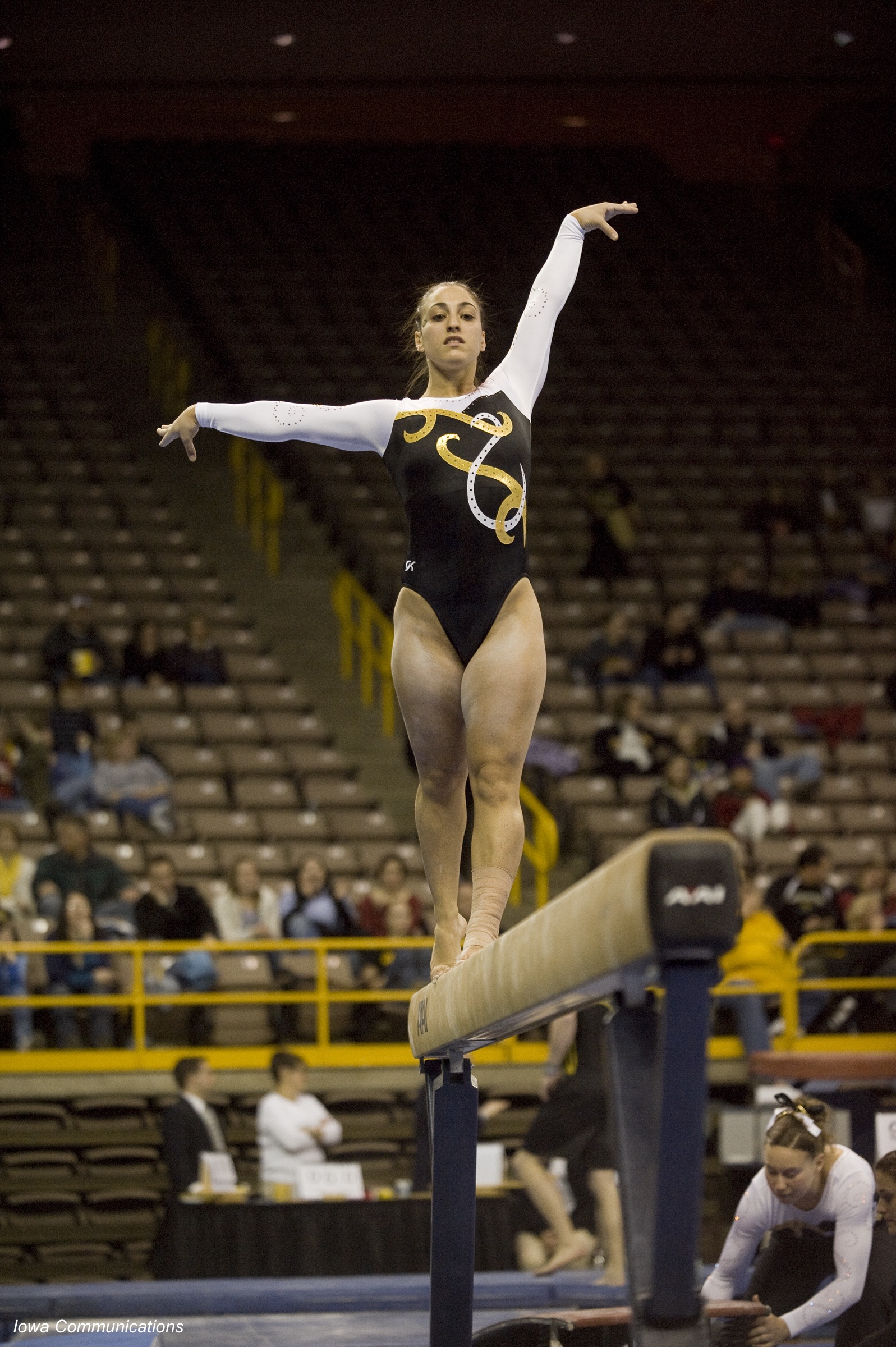 and prove to herself that she could, indeed, compete alongside the nation’s best.
and prove to herself that she could, indeed, compete alongside the nation’s best. Gebeshian’s determination won again, and the 2010 alternate came back to earn a trip to the 2011 NCAA Nationals.
“I felt relief when I made it to NCAA’s. It was my goal for the past 2 years. I needed to prove to myself that I could do it.”
Gebeshian’s impressive progression and success through her college career allowed her to realize that she was a standout competitor. During her junior year, she began to ponder the idea of continuing gymnastics beyond college.
While she knew that she was probably not good enough to crack the brutally-tough U.S. lineup, with dual citizenship the possibility of competing internationally was still on the table. When the idea popped into her head, she immediately went to Coach Gaveika to ask if he thought it would be possible. He affirmed her desire, and Gebeshian began training for the London Olympics.
Armenian Roots
Gebeshian’s Armenian roots go back to the time of her grandparents, who lived in the country during the the Armenian Genocide of 1915, which displaced Armenians all over the world.
While her family was fortunate enough to not be among the 1.5 million Armenians massacred by the Ottoman government, they were forced to seek refuge in Lebanon. When civil war broke out in Lebanon in 1975, her family uprooted again for the United States.
Since pursuing gymnastics opportunities for Armenia, Gebeshian has traveled to her native land twice, but only for short periods of time. Armenian was her first language and with a little practice, she is able to pick it back up quite easily today, which allows her to communicate when she travels back.
She longs to immerse herself in the culture—one that is very rich with traditional foods, music, and language. As the first Christian nation, much of Armenian culture is also centered around the church, and Gebeshian has found an incredibly supportive Armenian community associated within her local Armenian Church.
Gebeshian very much identifies with her heritage.
“It is definitely important to me to learn and pass on all the traditions of my family and culture,” she said.
A Whole New World
Gebeshian pursued a degree in athletic training at Iowa, and she planned to finish in four and a half years, which had her graduating in December of 2011.
After her senior year was complete, she stayed in Iowa to begin her new journey, training with Linas and Iowa head coach Larissa Libby. After a little time off at the conclusion of her great senior season, she had four months to prepare for the 2011 World Championships.
In that time, she could’ve never imagined the amount of adjustments she’d have to make, and the adversity she would face in switching from NCAA rules to the FIG Code—including big changes in her bar and vault settings.
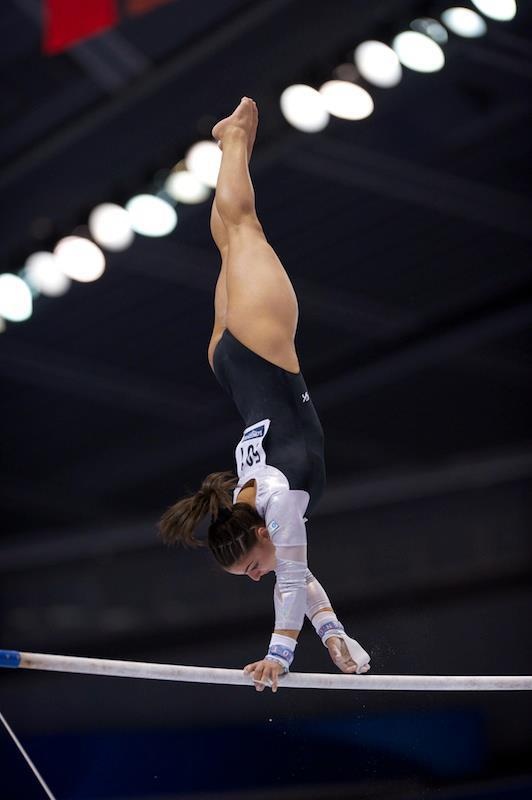 “In college my bars were like way far out, but not FIG…your tap is all different for every single skill,” Gebeshian said. “My giants were all off. Any skill was just all off. But it ended up working fine.”
“In college my bars were like way far out, but not FIG…your tap is all different for every single skill,” Gebeshian said. “My giants were all off. Any skill was just all off. But it ended up working fine.”Gebeshian was making progress, and feeling ready to compete despite heel pain. A month before Worlds, that pain was diagnosed as a stress fracture in her heel. With no time to allow the injury to mend, Gebeshian continued training, but only on bars and beam leading up to Worlds. The situation depleted her confidence heading into her first international competition.
“I had to add new skills into my routines and up the level of my training,” Gebeshian explained. “My body just wasn’t ready for it, and ended up breaking.”
She didn’t know if she’d be able to hold up physically for all four events, but she remained steadfast in getting through them. In the training hall the day before the competition, her resolve strengthened.
“I was like ‘I’m going to compete all four events—I don’t care if I land on my face—I have to do it,’” Gebeshian said.
While she had a lot of experience competing as a former collegiate athlete, she was practically a novice compared to the field at Worlds.
“I was a little bit star struck because I was thinking, ‘Wow, I am competing in the same arena with the best gymnasts in the world,’” Gebeshian said.
“I wish I would have had a little bit more international experience. The demeanor of everybody there—the judges, the athletes, the coaches, just the environment—was just totally, totally different.”
As the lone gymnast representing Armenia, Gebeshian felt the pressure of performing for her country. She competed four very watered-down routines, placed 128th in the all-around, and fell short of earning an automatic bid to the Olympic Test Event.
Instead, she was the first reserve—again.
“There was a lot of expectations for me to perform, for me to represent my country well, and I didn’t,” Gebeshian said. “It was devastating for sure.”
Being an alternate to the Test Event, came with a lot of uncertainty. Gebeshian didn’t know if her heel stress fracture would have sufficient time to heal, and if it did would another athlete in the field drop out, creating the opening for her to compete?
Nevertheless, she kept her strength up through conditioning, and clung to the glimmer of
hope that she could compete in the Test Event, show herself well, and earn selection to the
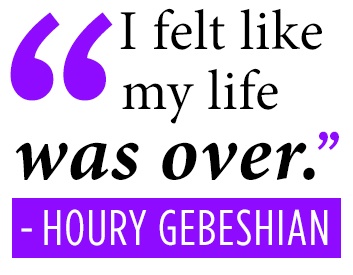 Armenian Olympic Trials.
Armenian Olympic Trials.No one dropped out. Gebeshian was devastated.
“I felt like my life was over,” she said. “I didn’t know what to do with myself.”
Depressed, Gebeshian curled up in bed most days and didn’t move.
“I couldn't get myself to do anything,” she said. “I couldn’t even get myself to walk into the gym because I was so upset. I stayed away from the gym for a while.”
Moving On
As the summer approached, Gebeshian realized it was time to move on with her life. She had applied for graduate school back in 2011, and began a two-year PA program at Wake Forest University in North Carolina.
She thought perhaps starting her professional career would fill the emotional void she felt from the absence of gymnastics. But just as she tried to turn the page, the London Olympic Opening Ceremony began and ripped open that emotional wound.
She recorded the Olympics in the hope that one day she would get over the hurt and be able to watch. That day has yet to arrive.
“It just upsets me,” she said. “I can’t watch it.”
Gebeshian’s first clinical rotation in her second year of PA school was in Cleveland, Ohio. It was there, on July 3, 2013, that she met her boyfriend, Duane. As a former football player, he and Gebeshian were able to bond over past athletic experiences and heartbreaks. Gebeshian shared her journey with him, and the more she spoke the clearer it became to him that she still longed for redemption.
“It was the encouragement that I received from him, along with the unfinished feeling I still had, that convinced me that I was not done with this sport,” Gebeshian said.
On July 18, 2013, Gebeshian decided that she was going to make a comeback. That day, she set the background image of her phone to the 2015 World Championships logo.
“From that point on, my goal was to compete at this World Championships,” she said. “I reminded myself every single time I looked at my phone.”
She decided she needed to get into a gym, and she learned that Wake Forest had a club gymnastics team. Gebeshian unofficially joined the team during the winter of 2013. But with her clinical rotations taking her to different locations every month, getting in any meaningful training was virtually impossible.
Whenever she was in town, she would try to go to practice. With the team lacking direction, the captain asked for Gebeshian’s help coaching. She wound up coaching more than training, and simply lacked the time to to do both.
But a simple glance at her phone reminded her of her goal, and kept her inner fire burning.
The Gymnastics Return
Gebeshian graduated from PA school in May of 2014, took a three-week trip to Europe in June, and then decided to move to Cleveland to begin training in earnest. She met with the owners of Gymnastics World in Broadview Heights, Ohio, who allowed her to train in their gym. On July 7, she stepped foot into the gym for her first practice. It had been three years since she had last trained seriously, and her body let her know it.
“Everything was hard,” she said. “They probably all thought I was a big joke.”
But Gebeshian’s determination has proven strongest when facing adversity.
Needing to fund herself while living in Cleveland, Gebeshian qualified for a position in the Department of Surgery at the Cleveland Clinic after completing PA school. However with full-time training, she knew it could be difficult to find a job that would fit her schedule. When she applied for the job and went on her interview, she told them, “Gymnastics is my number one priority, and in October of 2015 I will be going to Scotland for three weeks.”
A year and a half before Worlds, and Gebeshian had no doubts.
“I was already confident enough, and I knew that if that’s my goal, it’s going to happen,” she said.
The clinic said they would make it work, and Gebeshian found her stride delivering babies on the labor and delivery floor.
“It’s like the perfect job for me,” Gebeshian said.
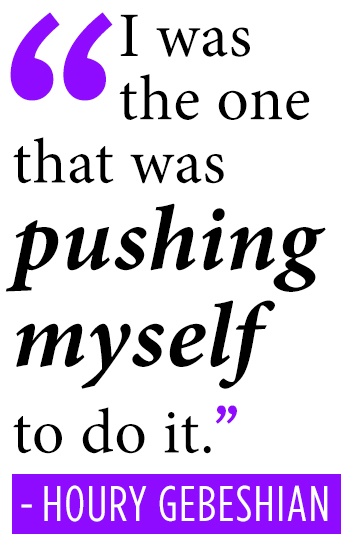
Physically, the road back also provided its fair share of challenges. Gebeshian was out of shape, so the first order of business was building up her strength, conditioning, cardio, and basics. It took almost three months before she was fit enough to get back on the apparatus. It was at that point that doubt crept in.
“I would come home and I would think to myself, ‘Why am I doing this?’” Gebeshian said. “‘How do I expect myself to even get up to the level I want to be at?’ I didn’t have a coach. I was the one that was pushing myself to do it.”
Gebeshian creates all of her own training plans, her strength and conditioning, routine progressions, and coaches herself every day in the gym. She receives some assistance in her training from Gaveika, who describes his role as more of a consultant or mentor. He provides encouragement, and gives recommendations, but at the end of the day he said, “It’s all Houry. She’s one of those people who she has the plan and she executes it to a T. You give her a little bit of guidance and she executes it.”
Gebeshian has gained great confidence in Gaveika’s guidance.
“Here and there I’ll have a question for him,” she said, “but mostly he’s just kind of been there to reassure me that I’m on the right track.”
Gebeshian’s grind, this time, has been a solitary one, unlike her prior gymnastics experiences from when she started through college.
“Growing up, your teammates are your best friends,” she said. “I’m used to having those types of people around me. But here I am now, just me and my TiVo.”
Conclusion: The Time Has Come
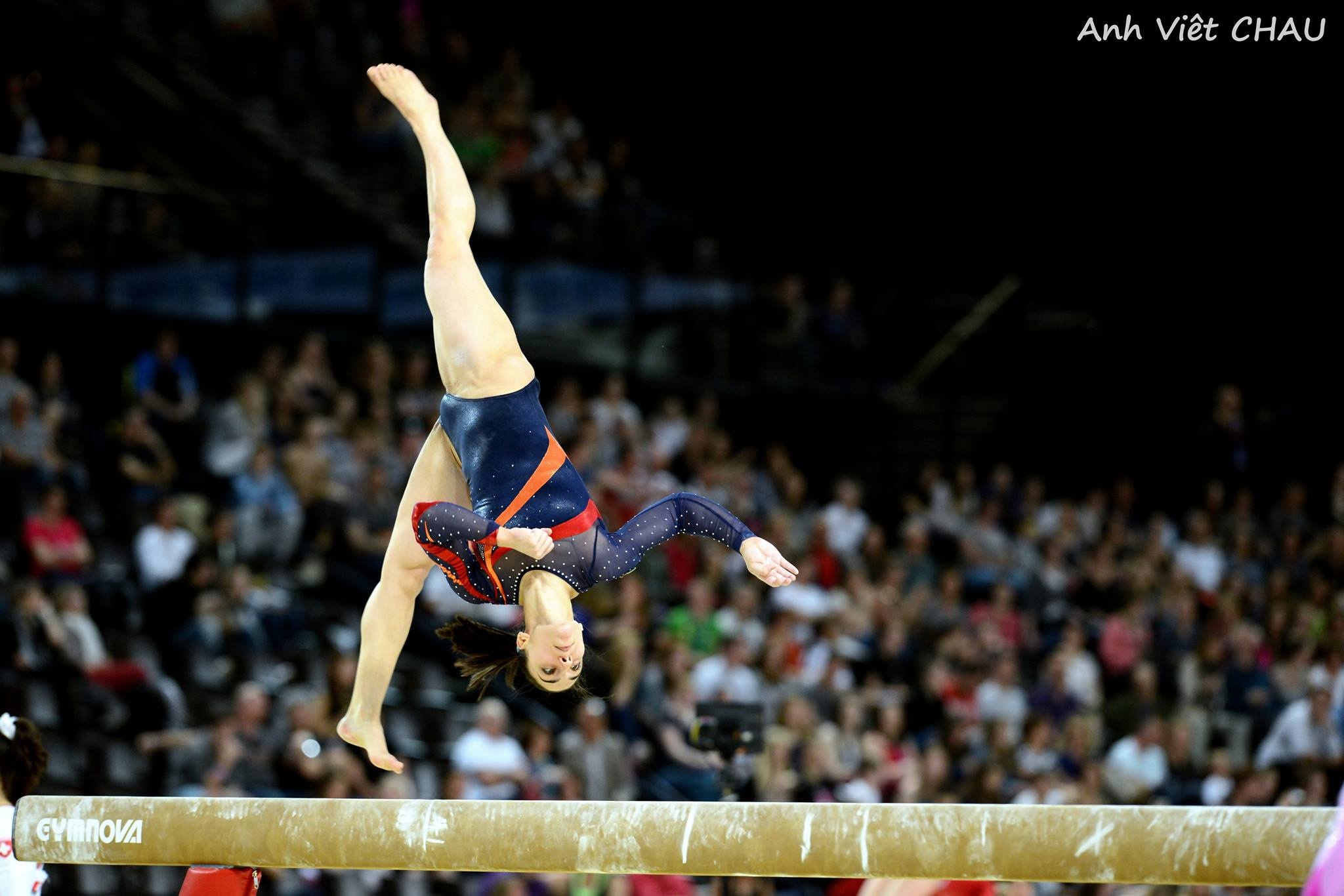
Gebeshian regained most of her skills by the onset of 2015, and was in routine shape by March. She hasn’t added difficulty, but rather plans to perform cleanly and confidently the skills she would’ve done if she had been healthy at 2011 World Championships.
“I think my gymnastics is the best I’ve ever done,” she said. “My body feels great. I feel like I’m doing all the right things right now. I’m in a good place and I need to keep this good place.”
While training for the World Championships, Gebeshian had been in contact with the the coaches in Armenia, who decided it would be beneficial for her to participate in an international competition beforehand. They decided that competing at the European Championships April 15-19 in Montpellier, France, would give her the experience and confidence needed to perform at her best at Worlds.
Gebeshian felt ready, but went in with absolutely no expectations.
“I wanted to hit four clean routines and that’s it,” she said. “I wanted to know that I could do it, and I needed the reassurance that I was ready to be out on the field. I wanted just to get my feet wet again.”
She did far more than that. Gebeshian was incredibly solid during qualifications, and carried momentum into the all-around final, where she placed 19th. The performance proved to both Gebeshian and the Armenian coaches that she has what it takes.
“I got a lot more praise, encouragement and positive feedback,” she said. “It was a really great experience. I’m glad I did it.”
After European Championships, Gebeshian slowed down her gymnastics-specific training a bit and focused on her strength and fitness. Compared to other elite gymnasts who are training 30-40 hours a week, Gebeshian knows she has to make the most of the 16 hours she puts in, and has to be smart about it as her body can no longer withstand 15 reps of the same skill.
“I’m not trying to overdo anything,” she said. “I’m keeping my numbers down, I’m keeping my strength up, and kind of the whole package is there.”
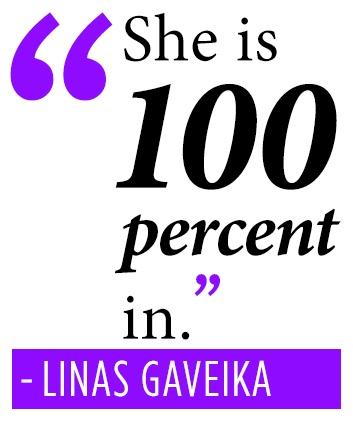 Gebeshian has been in close contact with the Armenian coaches who signed her up for Worlds. She sends videos, and updates to show she is ready for the competition. She does not receive financial support from the Armenians, since she trains in the U.S., and is expected to cover the costs of all her entry fees, travel, lodging, equipment, and gear.
Gebeshian has been in close contact with the Armenian coaches who signed her up for Worlds. She sends videos, and updates to show she is ready for the competition. She does not receive financial support from the Armenians, since she trains in the U.S., and is expected to cover the costs of all her entry fees, travel, lodging, equipment, and gear. “I have fully funded myself this entire time,” she said. “But it’s a small price to pay to try and make my dream a reality.”
Gebeshian has blossomed into a different level of competitor this year in Gaveika’s eyes.
“I think the mindset is the key,” he said. “It’s like, she’s 100 percent submerged into it. She is dedicated to her training, she is dedicated to her diet, she is dedicated to her schedule. She is 100 percent in.”
At the World Championships, Gebeshian’s goal is to hit four for four with no major mistakes. “If I do that I will be incredibly happy,” she said.
But Gebeshian has even bigger goals on the horizon and they lie in Rio.
“It is a legitimate goal of mine to qualify into an all-around final at the Olympics,” she said, adding that if she successfully learns a Yurchenko double full on vault, “I could realistically make it into a vault final.”
Those are lofty goals, but Gebeshian knows to achieve big you’ve got to dream big.
“The little kid in me is like, ‘I want to be an Olympian,’” she said. “The big kid in me is like, ‘I deserve to be an Olympian.’ When I set a goal for myself, I have to accomplish it. That’s just me.”
Related:
See Houry at her latest intrasquad on bars here
Watch her beam here
Watch her vault here
Watch her floor here
Stay up to date with the latest 2015 Worlds coverage here